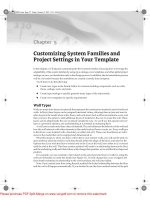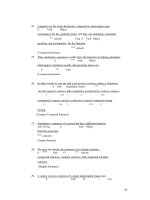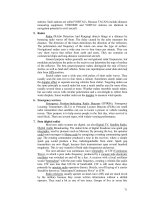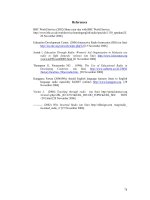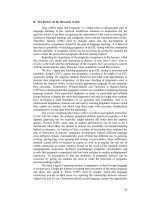Tài liệu Common erros in English part 6 docx
Bạn đang xem bản rút gọn của tài liệu. Xem và tải ngay bản đầy đủ của tài liệu tại đây (346.97 KB, 15 trang )
DE
LAPIDATED
deciet
Wrong spelling.
See
DECEIT.
decieve
Wrong spelling.
See
DECEIVE.
decision
decolletage
(not
de-)
decrepit
(not
-id)
defective
or
deficient?
DEFECTIVE
means
not
working properly
(a
DEFECTIVE
machine).
DEFICIENT
means lacking something vital
(a
diet
DEFICIENT
in
vitamin
C).
defer
deferred,
deferring, deference
See
ADDING ENDINGS
(iv).
deffinite
Wrong spelling.
See
DEFINITE.
deficient
See
DEFECTIVE
OR
DEFICIENT?.
definate
Wrong spelling.
See
DEFINITE.
definite
(not
-ff-,
not
-ate)
definitely
deisel
Wrong spelling.
See
DIESEL.
delapidated
Wrong spelling.
See
DILAPIDATED.
65
DELUSION
delusion
See
ALLUSION, DELUSION
OR
ILLUSION?.
denouement/denouement
Both
spellings
are
correct.
dependant
or
dependent?
The
adjective (meaning reliant)
is
always
-ent.
She
is a
widow
with
five
DEPENDENT children.
I
am
absolutely
DEPENDENT
on a
pension.
The
noun (meaning someone
who is
dependent)
has
traditionally been spelt
-ant.
However,
the
American
practice
of
writing either
-ant
or
-ent
for the
noun
has
now
spread here. Either spelling
is now
considered correct
for the
noun
but be
aware that
some conservative readers would consider this
slipshod.
She
has five
DEPENDANTS/DEPENDENTS,
descent
See
DECENT
OR
DESCENT?.
describe
(not
dis-)
description
(not
-scrib-)
desease
Wrong spelling.
See
DISEASE.
desert
or
dessert?
A
DESERT
is
sandy.
A
DESSERT
is a
pudding.
desiccated
(not
dess-)
66
t
DEVICE/DEVISE
desirable
(not
desireable)
See
ADDING
ENDINGS
(ii).
desperate
(not
desparate)
The
word
is
derived
from
spes
(Latin
word
for
hope). This
may
help
you to
remember
the e in the
middle
syllable.
dessert
See
DESERT
OR
DESSERT?.
dessiccated
Wrong
spelling.
See
DESICCATED.
destroy
destroyed, destroying (not dis-)
See
ADDING
ENDINGS
(iii).
detached
(not
detatched)
deter
deterred, deterring
See
ADDING
ENDINGS
(iv).
deteriorate
(not
deteriate,
as it is
often
mispronounced)
deterrent
(not
-ant)
develop
developed, developing (not -pp-)
development
(not
developement)
device/devise
DEVICE
is the
noun.
A
padlock
is an
intriguing DEVICE.
67
t
t
t
DIAGNOSIS
DEVISE
is the
verb.
Try
to
DEVISE
a
simple burglar alarm.
diagnosis
(singular) diagnoses (plural)
See
FOREIGN PLURALS.
diagnosis
or
prognosis?
DIAGNOSIS
is the
identification
of an
illness
or a
difficulty.
PROGNOSIS
is the
forecast
of its
likely
development
and
effects.
diarrhoea
diary
(singular) diaries (plural)
See
PLURALS
(iii).
See
DAIRY
OR
DIARY?.
dictionary
(singular) dictionaries (plural)
(not
-nn-)
See
PLURALS (iii).
didn't
(not
did'nt)
See
CONTRACTIONS.
diesel
(not
deisel)
See
EI/IE
SPELLING
RULE.
dietician/dietitian
Both spellings
are
correct.
differcult
Wrong spelling.
See
DIFFICULT.
difference
(not
-ance)
different
(not
-ant)
different
from/to/than
'Different
from'
and
'different
to'
are now
both
t
68
DIRECT
SPEECH
considered acceptable
forms.
My
tastes
are
DIFFERENT
FROM
yours.
My
tastes
are
DIFFERENT
TO
yours.
Conservative
users would, however, much prefer
the
preposition
'from'
and
this
is
widely used
in
formal
contexts.
'Different
than'
is
acceptable
in
American
English
but is not yet
fully
acceptable
in
British English.
difficult
(not
differcult,
not
difficalt)
dilapidated
(not
delapidated)
dilemma
This
word
is
often
used loosely
to
mean
'a
problem'.
Strictly
speaking
it
means
a
difficult
choice
between
two
possibilities.
dinghy
or
dingy?
A
DINGHY
is a
boat (plural
-
dinghies).
See
PLURALS
(iii).
DINGY
means dull
and
drab.
dingo
(singular) dingoes
or
dingos (plural)
dining
or
dinning?
dine
+ ing =
dining
(as in
dining room)
din + ing =
dinning (noise dinning
in
ears)
See
ADDING ENDINGS
(i) and
(ii).
diphtheria
(not
diptheria
as it is
often mispronounced)
diphthong
(not
dipthong
as it is
often mispronounced)
direct
speech
See
INVERTED
COMMAS.
69
DISAGREEABLE
disagreeable
dis +
agree
+
able
disappear
dis +
appear
disappearance
(not
-ence)
disappoint
dis +
appoint
disapprove
dis +
approve
disassociate
or
dissociate?
Both
are
correct,
but the
second
is
more widely used
and
approved.
disaster
disastrous
(not
disasterous,
as it is
often
mispronounced)
disc
or
disk?
Use
'disc'
except when referring
to
computer disks.
disciple
(not
disiple)
discipline
discover
or
invent?
You
DISCOVER
something that
has
been there
all
the
time unknown
to you
(e.g.
a
star).
You
INVENT
something
if you
create
it for the first
time
(e.g.
a
time machine).
discreet
or
discrete?
You
are
DISCREET
if you can
keep secrets
and
behave
diplomatically.
Subject
areas
are
DISCRETE
if
they
are
quite
separate
and
unrelated.
70
DISINTERESTED
OR
UNINTERESTED?
discrepancy
(singular) discrepancies (plural)
discribe
Wrong
spelling.
See
DESCRIBE.
discribtion
Wrong
spelling.
See
DESCRIPTION.
discription
Wrong
spelling.
See
DESCRIPTION.
discuss
discussed,
discussing
discussion
disease
diseased
See
DECEASED
OR
DISEASED?.
dishevelled
disintegrate
(not
disintergrate)
disinterested
or
uninterested?
Careful
users would wish
to
preserve
a
distinction
in
meaning between these
two
words.
Use the
word
DISINTERESTED
to
mean
'impartial,
unselfish,
acting
for the
good
of
others
and not for
yourself.
My
motives
are
entirely
DISINTERESTED;
it is
justice
I am
seeking.
Use
UNINTERESTED
to
mean
'bored'.
His
teachers
say he is
reluctant
to
participate
and is
clearly
UNINTERESTED
in any
activities
the
school
has to
offer.
Originally,
DISINTERESTED
was
used
in
this sense
(=
having
no
interest
in,
apathetic),
and it is
interesting
that this meaning
is
being
revived
in
popular speech.
71
t
DISIPLE
Avoid
this
use in
formal
contexts, however,
for it is
widely perceived
as
being incorrect.
disiple
Wrong
spelling.
See
DISCIPLE.
disk
See
DISC
OR
DISK?.
displace
or
misplace?
To
displace
is to
move someone
or
something
from
its
usual place:
a
DISPLACED
hip;
a
DISPLACED
person
To
misplace something
is to put it in the
wrong
place (and possibly
forget
where
it
is):
a
MISPLACED
apostrophe;
MISPLACED
kindness
dissappear
Wrong
spelling.
See
DISAPPEAR.
dissappoint
Wrong
spelling.
See
DISAPPOINT.
dissapprove
Wrong spelling.
See
DISAPPROVE.
dissatisfied
(dis
+
satisfied)
dissociate
See
DISASSOCIATE
OR
DISSOCIATE?.
distroy
Wrong
spelling.
See
DESTROY.
divers
or
diverse
The
first is
rarely used nowadays except jokingly
or
in
mistake
for the
second.
DIVERS
means
'several',
'of
varying types':
DIVERS
reference
books.
DIVERSE
means
'very
different':
DIVERSE
opinions,
72
DOUBLE
NEGATIVES
DIVERSE
interests.
does
or
dose?
DOES
he
take
sugar?
He
DOES,
(pronounced 'duz')
Take
a
DOSE
of
cough mixture every three hours.
doesn't
(not
does'nt)
See
CONTRACTIONS.
domino
(singular) dominoes (plural)
See
PLURALS
(iv).
don't
(not
do'nt)
See
CONTRACTIONS.
dose
See
DOES
OR
DOSE?.
double meaning
See
AMBIGUITY.
double negatives
The
effect
of two
negatives
is to
cancel each other
out. This
is
sometimes done deliberately
and can be
effective:
I
am not
ungenerous.
(=1
am
very generous.)
He
is not
unintelligent.
(= He is
quite intelligent.)
Frequently,
however,
it is not
intentional
and the
writer ends
up
saying
the
opposite
of
what
is
meant:
I
haven't
had no
tea.
(=1
have
had
tea.)
You
don't
know nothing.
(=
You
know something.)
Be
particularly
careful
with
'barely',
'scarcely',
'hardly'.
These have
a
negative
force.
I
wasn't
SCARCELY
awake when
you
rang.
(=1
was
very awake.)
Be
careful
too
with constructions like this:
73
DOUBLING
RULE
I
wouldn't
be
surprised
if he
didn't
come.
Say
either:
I
wouldn't
be
surprised
if he
came,
or: I
would
be
surprised
if he
didn't come.
Sometimes
writers
put so
many negatives
in a
sentence that
the
meaning becomes
too
complicated
to
unravel:
Mr
Brown denied vehemently that
it was
unlikely
that
no one
would come
to the
concert.
Does
Mr
Brown think that
the
concert will
be
popular
or
not?
Rewrite
as
either:
Mr
Brown
was
certain
the
concert would
be
well
attended.
Or:
Mr
Brown
feared
that
no one
would come
to the
concert.
doubling
rule
See
ADDING
ENDINGS
(i) and
(iv).
doubt
(not
dout)
The
word
is
derived
from
the
Latin
word
dubitare,
to
doubt.
It may
help
you to
remember that
the
silent
b is
there.
Down's
syndrome
(not
Downe's)
downstairs
(one word)
draft
or
draught?
A
DRAFT
is a first or
subsequent attempt
at a
piece
of
written work before
it is finished.
A
DRAUGHT
is a
current
of
cool
air in a
room.
74
DUE
TO/OWING
TO
One
also
refers
to a
DRAUGHT
of
ale,
a
game
of
DRAUGHTS
and a
boat having
a
shallow
DRAUGHT.
drawers
or
draws?
DRAWS
is a
verb.
She
DRAWS
very well
for a
young child.
DRAWERS
is a
noun.
The
DRAWERS
of the
sideboard
are
very
stiff.
dreamed/dreamt
Both
spellings
are
correct.
drier
or
dryer?
DRIER
is
generally used
for the
comparative
form
(DRIER
=
more
dry).
DRYER
is
generally used
for a
drying machine (hair
DRYER,
clothes
DRYER)
However, both spellings
are
interchangeable.
drunkenness
drunken
+
ness
dryness
(exception
to the -y
rule)
See
ADDING ENDINGS
(iii).
dual
or
duel?
DUAL
means
two
(e.g.
DUAL
controls,
DUAL
carriageway).
DUEL
means
fight or
contest.
duchess
(not
dutchess)
due
to/owing
to
Strictly
speaking,
'due
to'
should refer
to a
noun:
His
absence
was DUE TO
sickness,
(noun)
The
delay
was DUE TO
leaves
on the
line,
(noun)
'Owing
to',
strictly speaking, should refer
to a
verb:
75
DUEL
The
march
was
cancelled
OWING
TO the
storm.
(verb)
OWING
TO an
earlier
injury,
he
limped badly.
(verb)
However,
in
recent years,
the use of
'due
to'
where
traditionally
'owing
to'
would
be
required
has
become widespread. Nevertheless, some
careful
writers continue
to
preserve
the
distinction
and you
may
wish
to do so too in a
formal context.
duel
See
DUAL
OR
DUEL?.
duly
(not
duely)
This
is an
exception
to the
magic
-e
rule.
See
ADDING ENDINGS (ii).
dutchess
Wrong
spelling.
See
DUCHESS.
dwelled/dwelt
Both
spellings
are
correct.
dyeing
or
dying?
DYEING
comes
from
the
verb
to
dye.
She
was
DYEING
all her
vests green.
DYING
comes
from
the
verb
to
die.
She
cursed
him
with
her
DYING
breath.
76
earnest
or
Ernest?
EARNEST
=
serious
and
sincere
ERNEST
=
masculine
first
name
echo
(singular) echoes (plural)
See
PLURALS
(iv).
economic
or
economical?
ECONOMIC
=
related
to the
economy
of the
country,
or
industry
or
business
ECONOMICAL
=
thrifty,
avoiding extravagance
ecstasy
(singular) ecstasies (plural)
See
PLURALS
(iv).
77
Ecstasy
illegal drug
eczema
-ed or -t?
These
can be
either:
burned burnt
dreamed dreamt
dwelled
dwelt
kneeled knelt
leaned leant
leaped leapt
learned learnt
smelled smelt
spelled spelt
spilled spilt
spoiled
spoilt
eerie
or
eyrie?
EERIE
=
strange, weird, disturbing
EYRIE
= an
eagle's nest
E
effect
See
AFFECT
OR
EFFECT?.
effective,
effectual
or
efficient?
EFFECTIVE
=
able
to
produce
a
result:
an
EFFECTIVE
cure
an
EFFECTIVE
speech
EFFECTUAL
=
likely
to be
completely
successful:
EFFECTUAL
prayer
EFFECTUAL
legislation
EFFICIENT
=
working well without wasting time,
money
or
effort:
an
EFFICIENT
secretary
an
EFFICIENT
engine
ei/ie
spelling
rule
Remember
the
jingle:
i
before
e
except
after
c
or
when sounded like
a
as
in
'neighbour'
and
'weigh'.
Here
are
some examples which follow
the
rule.
There
are
plenty
of
others.
ie ei
after
c
achieve ceiling
believe conceited
chief
conceive
field
perceive
friend
receive
hygiene
ei
sounding like
a
priest eight
relief
reign
retrieve reindeer
shield skein
shriek
sleigh
thief
vein
78
EFFECT
EITHER
OR
Proper names
(e.g.
of
people
or
countries)
don't
follow
the
rule: Deirdre, Keith,
Neil,
Sheila, Madeira,
etc.
eighth
(notice
-hth)
See
EI/IE
SPELLING
RULE.
either
(not
-ie-)
An
exception
to the
EI/IE SPELLING RULE.
either
.or
(i)
Take care with singular
and
plural verbs.
Use
these exemplar sentences
as a
guide:
Either
Jack
or Tom was
there,
(singular verb
to
match Jack (singular)
or Tom
(singular))
Either
Jack
or his
brothers were
there,
(plural
verb
to
match
'brothers'
(plural) which
is
closer
to it
than
'Jack'
(singular))
Either
his
brothers
or
Jack
was
there,
(singular
verb
this time because
'Jack'
(singular)
is
closer
to the
verb than
'brothers')
(ii)
Be
careful
to
place each part
of the
'either
or'
construction correctly.
I
have decided either that
I
have
to
build
an
extension
or I
have
to
move.
I
have decided that either
I
have
to
build
an
extension
or I
have
to
move.
79
18
exceptions
caffeine
forfeit
seize
codeine heifer sheikh
counterfeit
height sovereign
either
leisure
surfeit
Fahrenheit neither weir
foreign
protein
weird
t
